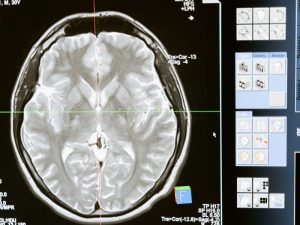Experiencing a brain injury can be an extremely traumatizing event. Whether you suffered a traumatic brain injury (TBI) from a sports injury or if you were injured after a car or motorcycle accident, any form of head injury should be taken seriously. Seeking professional medical care should be the immediate first step after experiencing an accident or injury in order to get imaging tests such as a computerized tomography (CT) scan or magnetic resonance imaging (MRI) to view the brain. Once medical professionals are able to get a detailed view of the brain and understand the extent of your injury, then you can take the proper treatments and steps to recovery.
Types of Brain Injury
According to the Brain Injury Association of America, a traumatic brain injury is defined as “an alteration in brain function, or other evidence of brain pathology, caused by an external force.” On the other hand, a non-traumatic brain injury or also known as an acquired brain injury is defined as “an injury to the brain that is not hereditary, congenital, degenerative, or induced by birth trauma.” Non-traumatic brain injuries involve brain damage caused by internal factors such as a lack of oxygen, exposure to toxins, pressure from a tumor.
Depending on the accident or cause of the injury, traumatic brain injuries can range from mild to severe and can require different forms of treatment and steps to recovery. Cleveland Clinic describes the several grades and types of traumatic brain injury which include:
- Mild concussion: concussions are the most common type of TBI which can include temporary alterations of consciousness or loss of consciousness for less than 30 minutes
- Moderate TBI: a moderate TBI is characterized by a loss of consciousness for over 30 minutes but less than one day, and confusion can last for up to one week
- Severe TBI: a severe TBI is characterized by a loss of consciousness for over one full day and is generally associated with significant changes seen through CT or MRI scans
- Closed: a majority of TBIs are closed, meaning an external force caused a blow or sudden jolt to the head that did not penetrate the skull, but impact to the head causes the brain to swell
- Open: an open TBI, or also known as a penetrating TBI, occurs when a bullet, knife or other object penetrates the skull, directly damaging brain tissue if the object reaches the brain

Common Causes of Traumatic Brain Injury
Since traumatic brain injuries are caused by external forces such as a sudden impact to the head, they often occur very unexpectedly. Some of the most common causes of traumatic brain injury include:
- Slip and fall accidents
- Workplace injuries
- Construction accidents
- Physical assaults
- Car accidents
- Motorcycle accidents
- Pedestrian accidents
- Sports/recreational injuries
- Gunshot wounds
- Domestic violence and child abuse
- Military actions
Stages of Recovery After a Traumatic Brain Injury
- Complete physical and cognitive rest for 24-72 hours. The days immediately following a brain injury, it is important to avoid any activities that are physically or cognitively demanding. This includes avoiding activities such as sports, driving a vehicle or biking, reading, working, and sustained computer use.
- Gradually resume everyday activities as symptoms of injury ease. After self-monitoring and symptoms have subsided, you can slowly resume daily activities. This includes non-intensive work from home, light housekeeping, reading, etc., but all while keeping an eye on returning or worsening symptoms.
- Gradually return to exercise while monitoring symptoms. Avoid intense or strenuous exercises that make your symptoms return.
- Call a doctor or your healthcare provider if symptoms worsen or if you experience confusion, memory loss, excessive fatigue, extreme irritability, loss of consciousness, nausea and vomiting, or seizures or convulsions.
If a third party is responsible for your brain injury, it is important to seek legal help to secure compensation for your injuries. The experienced attorneys at Cannon & Dunphy S.C. have represented brain injury victims who have suffered from motor vehicle accidents, work injuries, slip and fall injuries, and more. After seeking medical attention for your brain injury, contact a skilled brain injury attorney for help holding the negligent party liable for their actions.


No Comment